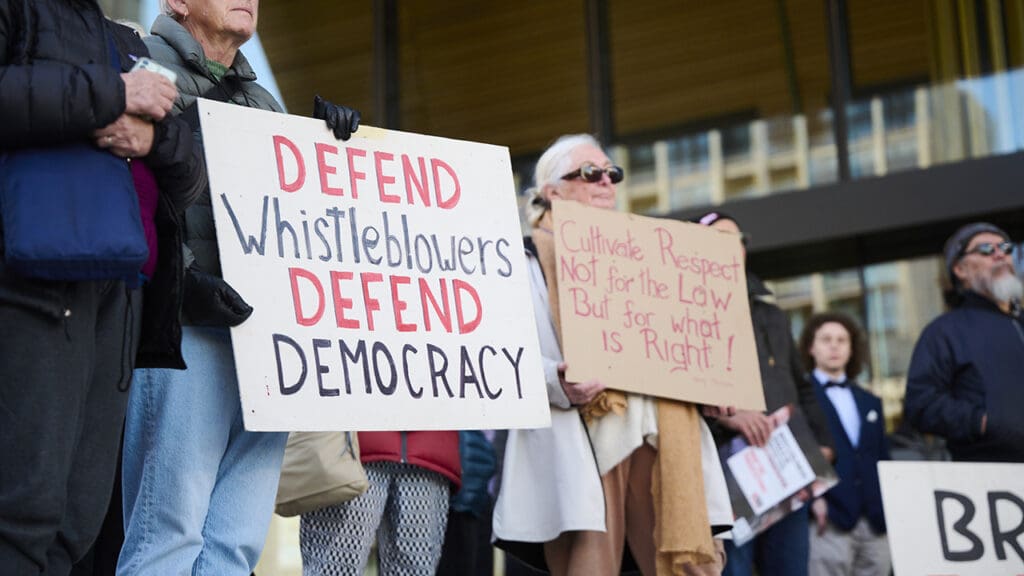Inside Bernard Collaery’s trial
OPINION | This article was originally published by The Saturday Paper.
Three years ago, Collaery – an eminent Canberra lawyer – was charged with five secrecy offences. Four relate to Collaery’s communications with the ABC; one involves an alleged conspiracy with Witness K, Collaery’s client and a former spy, to communicate secrets to the government of Timor-Leste.
The context underlying these charges is that our government spied on Timor for commercial advantage during negotiations over oil and gas in the Timor Sea. Australia, one of the richest countries in the world, bugged the cabinet office of an impoverished, newly independent neighbour as it sought to rebuild following Indonesia’s destructive invasion. All this was done for the sake of a financial windfall for Australia and private-sector energy companies.
The government has wrapped this case in so much secrecy, and has picked so many obscure procedural battles, that it can be almost impossible to keep up … All of this – a dozen interlocutory judgements, 50 or so court hearings – has been instigated by the federal government against one man.
Australia’s government has never admitted this, although it is widely accepted as true. We have never apologised to the Timorese. Instead, the government approved the prosecutions of Collaery and Witness K and has done all it can to keep the cases from the public eye. (K pleaded guilty to a lesser charge earlier this year, and was given a suspended sentence.)
The purpose of all this secrecy was spelled out last June, in a judgement of Justice David Mossop of the ACT Supreme Court, granting the attorney-general’s request for a largely secret trial. The crux of what the government wanted, wrote Mossop, was to keep secret “the evidence led by the Crown that establishes what part of the matters communicated by Mr Collaery were true … By this mechanism the Attorney‑General hopes to maintain a position of ‘neither confirm nor deny’ (NCND) in relation to the subject matter of the [redacted].”
Albeit obscured by legalese, this is a stark observation. In other words, in order to successfully prosecute Collaery the government will have to admit in court that it spied on Timor-Leste. This is because it is not a crime to make things up and tell journalists, so the information Collaery is alleged to have communicated must be true. The government does not want to admit that publicly, so it has sought secrecy to allow it to deceive the Australian people, to say one thing in the privacy of a closed courtroom and another thing in public. As the government seeks to shroud the Collaery trial in secrecy, the deck is stacked in its favour: the relevant law, the National Security Information Act, insists that judges give “greatest weight” to the opinion of the attorney-general.
Collaery appealed Justice Mossop’s decision. The appeal was heard behind closed doors. Observers, including myself, were marched out within minutes. In early October, the ACT Court of Appeal accepted Collaery’s argument, holding that most of the trial should be in open court. In an eye-catching summary, the court warned that a secret trial could undermine public confidence in the justice system. “Open hearing of criminal trials was important,” the summary reads, “because it deterred political prosecutions.”
That should have been the end of the matter. Three senior judges told the Australian government that secrecy in this case might undermine public faith in our judiciary. But it is at this juncture that this deeply disturbing case has taken an even more Kafkaesque turn.
Collaery is now battling the attorney-general on two separate fronts. First, in relation to this critically important Court of Appeal judgement, the government applied for large swaths of the judges’ reasons to be redacted before they were released publicly. They want parts of a judgement that said no to a secret trial to itself be kept secret.
Last month, ACT Chief Justice Helen Murrell heard arguments about the extent of redactions. On the day Murrell was due to release the judgement – partially redacted, but apparently not sufficiently for the government’s liking – Attorney-General Michaelia Cash’s lawyers asked for a delay so they could consider appealing to the High Court. Not in relation to the judgement itself, but about the extent of the redactions. The absurdity is breathtaking.
The other front in this ongoing saga concerns secret evidence. When the parties were arguing about the extent of secrecy before the trial judge, Mossop, back in 2020, the government sought to use secret evidence – that Collaery could not see – to persuade Mossop about the necessary secrecy to be applied. Mossop decided he could reach his decision without determining whether to accept secret evidence.
But now that the Court of Appeal has overturned Mossop’s initial decision, the attorney-general wants another bite of the cherry. Her lawyers are before Mossop again, arguing that the existing evidence (which was secret from the public at large, but at least visible to Collaery) should be supplemented with new, super-secret evidence (which not even Collaery can see). The attorney-general says that on this basis the judge should remake the decision, and allow the trial to go ahead in secret, despite what the Court of Appeal said.
If at this point you are confused, you are not alone. The government has wrapped this case in so much secrecy, and has picked so many obscure procedural battles, that it can be almost impossible to keep up.
This latest fight on secret evidence was in court on Friday. Whatever Mossop’s decision, it will almost certainly return to the Court of Appeal, and could end up in the High Court. An actual trial, before a jury, whether in secret or not, is unlikely to be heard until 2023 at the earliest.
All of this – a dozen interlocutory judgements, 50 or so court hearings – has been instigated by the federal government against one man. Collaery strikes a brave figure, calling out injustice inside the courtroom and out. But the process, with no end in sight, has evidently taken a toll. He is up against the might of the government, which has spent almost $4 million in taxpayer dollars on legal fees in this and the Witness K case. In Collaery’s corner are a group of distinguished lawyers and barristers working for free, because they recognise the importance of this fight.
Even in isolation, the outcome is crucial. But the chilling nature of the Collaery prosecution is compounded when set against a backdrop of creeping secrecy and surveillance. Our journalists are being raided and our whistleblowers are on trial – not just Collaery, but also David McBride, who blew the whistle about alleged war crimes in Afghanistan, and Richard Boyle, who spoke up about misconduct at the tax office. In both cases, the whistleblowers thought they were doing the right thing, following the letter of whistleblowing law. Now they face jail time for speaking up in the public interest.
While overseeing these prosecutions, the government has delayed crucial reform to whistleblowing law that might prevent history repeating. An independent review called for urgent reform in 2016. Four years later, last December, the Morrison government belatedly accepted the review’s recommendations. Another 12 months on, there has still been no substantive progress. Reform before the election is now unlikely. Instead, the government has been busy enacting new surveillance laws – that can be used against journalists and whistleblowers, with only patchy safeguards – and increasing the severity of secrecy offences.
In another particularly alarming case, the same law governing secrecy in the Collaery trial was used to ensure the prosecution of a former spy was conducted entirely in secret. The defendant, Witness J, was sent to jail – and not even the ACT Justice minister, with oversight of the prison system, knew about it. Secret trials are anathema in a robust democracy, where open justice is a paramount principle.
What, then, is to be done? For a start, the Commonwealth Director of Public Prosecutions should drop the prosecution against Collaery – and Boyle and McBride. Whether held in secret or not, there is no public interest in prosecuting whistleblowers. All three are alleged to have spoken up about matters in the public interest. No one has denied the veracity of their truth-telling. The CDPP has the power to discontinue a case at any time; that authority should be exercised.
Attorney-General Cash is steadfast in her position that the government will not intervene to end the prosecution, even though she also holds that power. In the abstract, her position has some merit – politicising an independent prosecutorial service is ill-advised. But the prosecution has been political from the start, given it required former attorney-general Christian Porter’s explicit consent. His predecessor, George Brandis, had sat on it. Discontinuing one prosecution, in these extreme and compelling circumstances, is not a carte blanche invitation for future political meddling. In this case, it is the right thing to do.
At a broader level, law reform is urgently needed – to our whistleblowing, secrecy and surveillance laws. We need laws that empower whistleblowers to speak up, let journalists do their job and ensure neither group suffers as a result. It is a deep shame that no such change looks likely before the next election. Whoever wins should prioritise reform, end the current government’s ceaseless quest for secrecy, and, if necessary, direct the CDPP to discontinue the Collaery prosecution. An apology to the people of Timor-Leste is also overdue.
Whistleblowers make Australia a better place. They should be protected, not punished – and certainly not prosecuted in a secret trial, with secret evidence and secret judgements.

What issue unites Coalition, Labor, Green, teal and One Nation voters? Whistleblower protections
The Albanese Government’s persecution of whistleblowers Richard Boyle and David McBride is unjust, and the public doesn’t support it. It’s time for much-needed reform.
Read more
We’re fighting Tasmania’s parole board gag on free speech
We have filed legal proceedings on behalf of Tasmanian grandmother, Susan Neill-Fraser. Her case challenges a restrictive parole condition placed on her by the Parole Board of Tasmania which limits her ability to speak to the media.
Read more
Universities must stop restricting protests and surveilling staff and students
The Human Rights Law Centre is urging the University of Melbourne to abandon new policy changes that severely restrict protest rights and allow widespread surveillance of students and staff through the universities’ wifi network.
Read more




